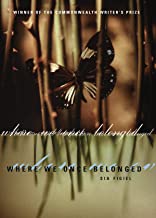Where We Once Belonged by Sia Figiel is a novel set in Samoa, a novel that won the Commonwealth Writers Prize. At one level it is a simple story of one girl’s journey through childhood and adolescence.
Alofa tells us about her school life, her church, her favourite television programmes, and her family. She tells us of local practices, customs and mores. She describes what she eats and how it is cooked. She details her relationships with her friends, parents and teachers. And in this way she builds for us a picture and sensation of growing up in Samoa.
Alofa is quite a late developer. Long after her friends have succumbed to the moon sickness, she has not begun to menstruate. It troubles her. She worries that she is not like other people, that she might be destined for a life that is different from theirs.
But she discovers what all adolescents discover, and delights in telling the minute detail of every encounter.
There are older men, younger men, and girls, mothers and boys. She has her share of experiences and learns that sometimes people are not what they seem.
Through Where We Once Belonged the reader thus experiences Samoan life, how it once was, and how it is changing. It is not a rich life, for sure, but the poverty, both material and personal, never grinds down either the community or the individual. Like everywhere else in human existence, some can cope with apparent ease, whilst others find the process of life more taxing.
The true beauty of Sia Figiel's novel, however, is that it provides a foil to external, Western interpretations of Samoan life. Mention of this contrast with ´official´ views of the culture come late in the book, because the perspective is consistently that of the young girl narrator. In some ways this is unfortunate, since the book has real direction once this is understood. Until then, a casual reader may not develop this informative and rewarding overview.
An uncommitted reader might also find the book a difficult read.
There is extensive use of Samoan words, whole sentences in places. Though there is a glossary, it is far from complete. There is a temptation not to refer to it and thus to gloss over some of the detail, and it is in this detail that the book’s real richness lies. Eventually, it is a rewarding read, in its particularistic, individual way.
View this book on amazon
Where We Once Belonged





No comments:
Post a Comment